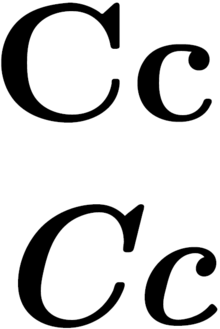Definify.com
Definition 2026
С
С
| ||||||
|---|---|---|---|---|---|---|
Russian
Noun
С • (S) m inan (indeclinable)
See also
Noun
С • (S) m anim (indeclinable)
с
с
| ||||||
|---|---|---|---|---|---|---|
Bulgarian

(С с), normal above, italics below.

Letter
с • (s) (lower case, upper case С)
- The eighteenth letter of the Bulgarian Cyrillic alphabet. Its name is съ (sɤ) and it has the sound of English s. It is preceded by Р and followed by Т.
Pronunciation 2
Alternative forms
- със (sǎs)
Preposition
с • (s)
- in the company of, alongside, with, and
- Той отиде с приятелите си. - He went with his friends.
- мляко с кафе - coffee with milk
- ние с тебе - you and I
- хляб с масло - bread and butter
- used to indicate interaction, with
- смесвам се с тълпата - to mingle with the crowd
- used to show the instrument of the action, with, by, by means of
- режа с нож - to cut with a knife
- пътувам с кола/автобус/влак - to travel by car/bus/train
- used to indicate the material used, in
- пиша с мастило - to write in ink
- работя с метали - to work in metals
- търгувам с жито - to deal in wheat
- used to show how or in what way something is done, with, by
- Той говореше за дъщеря си с голяма гордост. - He spoke about his daughter with great pride.
- слушам с внимание - to listen with attention
- стоя с ръце в джобовете - to stand with one's hands in one's pockets
- с всичка сила - with all one's might
- с главата напред - head foremost
- с глас - aloud
- с глух глас - in a toneless voice
- с един удар - at one blow
- с една дума - in a word
- с цената на - at the cost of
- със сила - by force
- улучвам с първия изстрел - to hit at the first shot
- because of something and as it happens, with
- Сенките се издължиха с наближаването на залеза. - The shadows lengthened with the approach of sunset.
- Умението идва с практика. - Skill comes with practice.
- used to indicate simultaneous happening, or immediate succession or consequence, with
- Книгата падна на пода с голям трясък. - The book fell to the floor with a loud bang.
- С влизането попита стопанина дали може да пренощува. - Immediately after he entered he asked the landlord if he could spend the night there.
- used to indicate according to what something develops or changes, with, over
- Налягането се мени с дълбочината. - The pressure varies with the depth.
- Здравето ѝ трябва да се подобри с времето. - Her health should improve with time.
- Тя се промени много с годините. - She has changed a lot over the years.
- having a particular characteristic, possession, etc., with, of
- момче със зелени очи - a boy with green eyes
- яке с качулка - a jacket with a hood
- човек с куфар - a man with a suitcase
- човек с голям опит - a man of great experience
- човек с весел нрав - a man of a cheerful disposition
- човек с вид на чужденец - a man of foreign appearance
- used to indicate the specific thing or person that is being referred to, with
- Моля те, внимавай с тези кутии. - Please be careful with those boxes.
- Те са в приятелски отношения със съседите си. - They are on friendly terms with their neighbors.
- Не съм много добре с компютрите. I'm not very good with computers.
- used to say that someone or something is the object of attention, behavior, or a feeling, with, to, towards, of
- гордея се с някого - to be proud of someone
- подигравам се с някого - to make fun of someone
- Какво стана с приятеля ти? - What happened with your friend?
- любезен/груб с някого - polite/rude to/towards someone
- in the performance, condition, behavior, or quality of something/someone, with
- Какъв е проблемът с колата ти? - What's the problem with your car?
- Лекарите се опитват да разберат какво не е наред с него. - The doctors are trying to figure out what is wrong with him.
- used in exclamations consisting of a repeated noun phrase and expressing blame, indignation, dissatisfaction, etc.
- Глупак с глупак! - You silly fool!
- Глупака му с глупак! - The silly fool!
- used to indicate the thing or person that replaces something/someone, for, by, with
- заменям A с B - to replace A by B
- Бих искал да заменя този пуловер с по-малък. - I'd like to exchange this sweater for a smaller one.
- Замених старото килимче с ново. - I replaced the old rug with a new one.
- used to indicate a large amount of something (most commonly time), for, in
- Чаках те с часове в дъжда. - I waited for you for hours in the rain.
- Не съм го виждал с години. - I haven't seen him in years.
- Хора с хиляди се тълпяха да я видят. - People flocked in their thousands to see her.
- used when comparing to indicate the difference in quantity, age, etc., by, with
- с един метър по-дълъг - longer by one metre/a metre longer
- с няколко години по-млад - a few years younger
- Закъснях с 10 минути. - I was 10 minutes late/too late by ten minutes.
- с един ден по-рано - a day early/too soon
- в сравнение с - in comparison with/compared with
- used to indicate connection, joining, with, to
- Полицията не можаха да я свържат с престъплението. - Police were unable to connect her with/to the crime.
- свързвам се с някого - to get in touch with someone
- used to indicate separation from someone/something, with
- Тя се раздели с приятелите си заради инцидента. - She broke ties with her friends because of the incident.
- in opposition to somebody/something, with, against
- боря се с бедността - to struggle against poverty
- бия се с някого - to fight with somebody
- играя футбол с някого - to play football with somebody
- Скарахме се със съседите заради височината на оградата. - We had a disagreement with our neighbors over the height of the new fence.
- used to say that something fills something, covers something, etc., with, of, by
- Гаражът е пълен с боклуци. - The garage is filled with junk.
- бутилка, пълна с мляко - a bottle full of milk
- ваза с цветя - a vase of flowers
- Стената цялата е покрита с графити. - The wall is completely covered with graffiti.
- Езерото е заобиколено с дървета. - The lake is surrounded with/by trees.
- used in wishes, greetings, salutations, parting phrases, etc.
- Със здраве! - So long!
- с най-добри пожелания - (with) best wishes
- с поздрав - best regards
- с уважение - respectfully yours
- сбогом - goodbye
Usage notes
In writing, със is used in front of words starting with с or з and с is used elsewhere. In speech, с and със are used interchangeably. In writing and in speech, със is also used as a stressed form of с, even before words not beginning with с or з, as in със или без твоя помощ - with or without your help. In verse, със can also be used in front of words not starting with с or з in order to maintain the syllable structure of the line.
Ossetian
Pronunciation
- (phoneme) IPA(key): /s~ʃ/
Letter
с • (s) (upper case С)
- The twenty-third letter of the Ossetian alphabet
See also
- (Cyrillic script letters) А (A) а (a), Ӕ (Æ) ӕ (æ), Б (B) б (b), В (V) в (v), Г (G) г (g), Гъ (Ǧ) гъ (ǧ), Д (D) д (d), Дж (Ǵ) дж (ǵ), Дз (Ʒ) дз (ʒ), Е (E) е (e), З (Z) з (z), И (I) и (i), Й (J) й (j), К (K) к (k), Къ (K’) къ (k’), Л (L) л (l), М (M) м (m), Н (N) н (n), О (O) о (o), П (P) п (p), Пъ (P’) пъ (p’), Р (R) р (r), С (S) с (s), Т (T) т (t), Тъ (Tʺ) тъ (t’), У (U) у (u), Ф (F) ф (f), Х (X) х (x), Хъ (Q) хъ (q), Ц (C) ц (c), Цъ (C’) цъ (c’), Ч (Ḱ) ч (ḱ), Чъ (Ḱ’) чъ (ḱ’), Ы (Y) ы (y)
Russian
Etymology 1
Pronunciation
- IPA(key): [s]
Letter
с • (s) (lower case, upper case С)
- The nineteenth letter of the Russian Cyrillic alphabet. Its name is эс (es) and it has the sound of English s. It is preceded by Р (R) and followed by Т (T).
Etymology 2
From Proto-Slavic *sъ(n), from Proto-Indo-European *ḱom.
Pronunciation
- IPA(key): [s]
Preposition
с • (s)
- with (+ instrumental case)
- from, off, from off, from below (with abstract nouns; nouns entailing a flat, open area; and special exceptions) (+ genitive case)
- because of, since (expressing a cause of motivation) (+ genitive case)
- с испу́га ― s ispúga ― due to being frightened
- for, about (indefinite time or number) (+ accusative case)
- (for indicating a duration of time; used in two forms: с +genitive по +accusative and с +genitive до +genitive)
- (for time expressions)
Usage notes
- со (so) is used before words with certain awkward consonant clusters such as мн (mn), вс (vs), and сн (sn).
- A noun phrase with the preposition с (s) or со (so) and an abstract noun declined with the instrumental case can show adverb-like qualities. The most notable ones are below:
- с внима́нием (s vnimánijem)
- с трудо́м (s trudóm)
- с удово́льствием (s udovólʹstvijem)
- совсе́м (sovsém)
Related terms
- лицо́м к лицу́ с (licóm k licú s)
Etymology 3
Abbreviation of санти- (santi-).
Pronunciation
- IPA(key): [sənʲtʲɪ] (phonetic respelling: санти-)
Prefix
с • (s)
- centi- (0.01)
Serbo-Croatian
Etymology 1
Pronunciation
- (phoneme) IPA(key): /s/
Letter
с (Latin spelling s)
Etymology 2
From Proto-Slavic *sъ(n), from Proto-Indo-European *ḱom.
Alternative forms
- (see usage notes) са
Pronunciation
- IPA(key): /s/
Preposition
с (Latin spelling s)
- (with instrumental) with, together with, along with
- радити с неким — to work with somebody
- свађати се с неким — to quarrel with somebody
- ратовати с неким — to wage war with somebody
- д(ј)евојка с плавом косом — a girl with blonde hair
- с годинама долази мудрост — with age comes wisdom
- с љубављу — with love
- (with instrumental) miscellaneous prepositional senses in various phrases
- шта/што је с тобом? — what's wrong with you?
- с временом — in time
- поздравити се с неким — to greet somebody
- (with genitive) from, off
- пао сам са стабла — I fell from the tree
- с друге стране — on the other side
- са запада — from the west
- с леђа — from the back
- проматрати с прозора — to observe from the window
- људи с планине — people from the mountain
- (with genitive) because of (= из, збо̏г)
- с тог разлога — because of that reason
Usage notes
с takes the alternative form са in the following environments:
- before /s, š, z, ž/:
- са стра́не̄ — aside
- са шко̑ло̄м — with school
- са зу̑бом — with tooth
- са живо̀том — with life
- before consonant clusters where the second consonant is /s, š, z/:
- са̀ псом (са псо̏м) — with dog
- са пшѐницо̄м — with wheat
- са р̏за̄њем — with neighing
- before instrumental form of first-person pronoun ја̑ (“I”)
- са̏ мно̑м — with me
Etymology 3
Alternative forms
Abbreviation
с (Roman spelling s)
